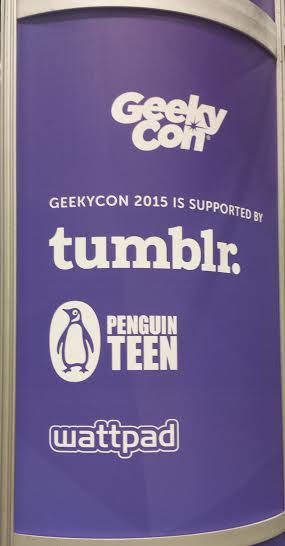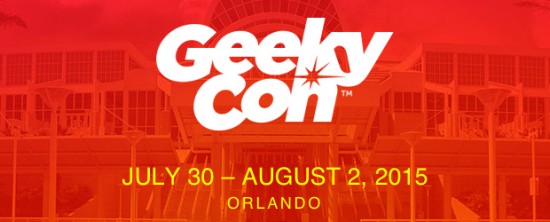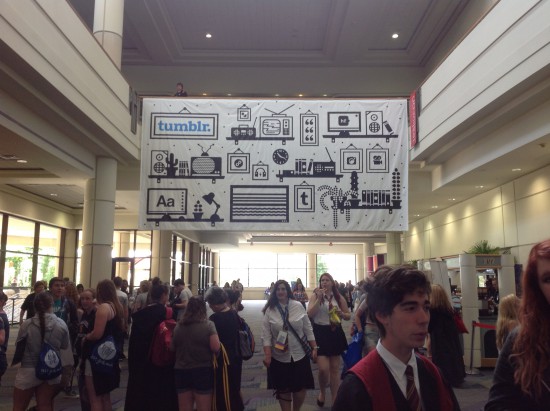Report from GeekyCon, Orlando, July 30-August 2: The Challenges of Rebranding a Feminist Con
Post by Allison McCracken and Jennifer Kelly, DePaul University
This summer, we have been presenting our research regarding the ways that many small, niche fan conventions have constructed feminine/feminist and queer safe spaces for young women and queer youth, providing alternatives to larger, more corporate cons that are dominated by white men and often lacking in the intense sense of community fostered by the smaller cons. The cons we analyzed were DashCon, GeekGirlCon, and LeakyCon. Of these cons, LeakyCon was the biggest (at 5,000). At the end of last year’s con, its organizers announced a brand change from “LeakyCon” (which began as a Harry Potter-themed con, but had become multi-fandom) to “GeekyCon.” It was clear from last year’s LeakyCon that more obvious corporate sponsorship and alliances were developing (particularly with Tumblr, whose signage dominated the main hall last year), and in our recent conference presentations, we wondered how this change in branding might affect the kind of feminist community feeling of previous LeakyCons.
The answer is, quite a lot. This GeekyCon was notably conflicted in a number of ways, the result, we think, of its organizers’ attempts to address feminist concerns within the larger fandom world and maintain a sense of safe and “positive” community space while, at the same time, also expanding its brand to include more commercial content by showcasing white, male panelists and performers (presumably cis and straight) and attracting audience members who reflected these same identity characteristics. The tensions between commerce and community, avowed feminism and queer inclusion in a con environment more inviting to men and boys, and a focus on “positivity” while lacking diverse representation among guests and attendees resulted in con that, despite some laudable progressive actions, generally felt lacking in the critical edge, community feeling, and affective resonance of past LeakyCons.
LeakyCon’s organizers, mostly women who are all self-identified feminists, have long taken a leading role in con inclusivity and participant safety. This year, GeekyCon took steps to validate its many transgender, genderqueer, and/or non-binary identified attendees, including providing gender-neutral bathrooms for the first time. In addition, transgender participants were actively involved in many con panels, not only those related to LGBTQ issues. The body positivity panel notably included a fat body positive activist for the first time. In addition, the con’s well-known policy against sexual harassment was affirmed and expanded this year through the con’s inclusion and support of the newly-formed “Uplift” organization. Uplift was founded last year by three female college students to combat sexual abuse in online communities and in direct response to a series of recent testimonials by many young women of such abuse by male performers in the Doctor Who and Harry Potter fandoms. Finally, GeekyCon has also become one of the sponsors of the “Positive Fandom” movement that focuses on creating safe and constructive fan spaces.
 Such welcome developments at GeekyCon, however, were often overshadowed and at times undermined by the con’s more commercial turn and its reduced female voices and participants, particularly in the big mainstage events. Panels were sponsored by corporations such as Wattpad, PenguinTeen, and Tumblr; although these commercial groups are reflective of and popular with GeekyCon’s participants (indeed, their representatives identify as fangirls and feminists), their increased presence in “safe” venues at times undercut the sense of intimacy and community GeekyCon has long fostered. For example, one popular group meet up during the con’s first session began with a message from a Wattpad representative.
Such welcome developments at GeekyCon, however, were often overshadowed and at times undermined by the con’s more commercial turn and its reduced female voices and participants, particularly in the big mainstage events. Panels were sponsored by corporations such as Wattpad, PenguinTeen, and Tumblr; although these commercial groups are reflective of and popular with GeekyCon’s participants (indeed, their representatives identify as fangirls and feminists), their increased presence in “safe” venues at times undercut the sense of intimacy and community GeekyCon has long fostered. For example, one popular group meet up during the con’s first session began with a message from a Wattpad representative.
More troubling was the commercial branding of GeekyCon with an adaptation of Missy Elliott’s song “Get Ur Freak On” called instead “Get Your Geek On,” which was performed both in promotional materials and during the con’s opening ceremonies and other events by majority white, largely male participants (the one black male could not help but seem like a token). This kind of cultural appropriation at a con already lacking in racial diversity was disconcerting, and the song’s dance club feel was also out of step with GeekyCon’s audience, who affiliate themselves more with pop and Broadway musical genres and aesthetics. GeekyCon is not lacking for songwriters among its performers; a more organic theme song would better encourage community building and affective response, which was notably lacking.
This sense of the con being literally out of tune with its audience was most obvious in its first-time use of an outside DJ at the annual Esther Earl Rocking Charity Ball. Instead of focusing on current pop songs and fan favorites, the DJ offered often undanceable club music that this audience didn’t know. The ball’s finale also skipped the annual tribute to the staff that has been an important affective moment of community in past years. There were many complaining fan tweets during the ball about the music and, as a result, less participation and emotional involvement overall.
In addition, although organization leaders used the term “positive fandom” in relation to safe space, there was a distinct disconnect between their use of the term and panel presenters generally, who defined “positivity” primarily as a lack of negativity. This shift resulted in silencing rather than enabling the kind of social critique that has characterized past cons and was particularly detrimental in relation to the marked increase in white, presumably cis and straight men at this con. Therefore, the invocation of “positive fandom” often rang hollow because it primarily came from people who inhabit a position of privilege (it is easier to be positive when you are not under attack) and was often accompanied by their professed unwillingness to speak about issues such as rape/racism in fan texts because they “don’t have the authority” to do so. Thus, the con’s focus on “positivity” and lack of diversity often worked in tandem to enable the marginalization of representational and community concerns vitally important to these fans.
Although GeekyCon’s organizers never planned to be primarily a female space, they have embraced and benefited from the “girl power” ethos. Certainly, we have always found the con’s radical potential linked to its privileging of women and queer people. Although GeekyCon is currently experiencing the understandable growing pains of rebranding, we very much hope it won’t lose those elements that have made it such a valuable feminist space.





Hey, just wanted to clear some things up here as there are some factually untrue statements in this article that I find damaging to the community as a whole and particularly perceptions of one of the largest safe spaces in terms of cons.
Firstly, this is not the first year there were gender neutral bathrooms. Much of the comprehensive approach to gender inclusiveness is new, but the bathrooms were there in Portland as well, a few years back.
In terms of panelists, much of the programming is fan submitted and many presenters are women and otherwise minorities. LGBTQIA+ based panels of varying types are common. This is one of the only conferences where I’ve seen a female YA writer, a trans woman writer showcasing a memoir, and a woman of color in the YA field all get substantial billing and programming input. and A panel this year tackled Joss Whedon and his problematic behaviors in terms of diversity and women. Lit Day authors this year were more diverse than they ever have been, and that’s considering that they have always fought to fairly represent and air issues of women in a male dominated field. Mark Oshiro who is a huge advocate of safe spaces had several panels on representation, read from his upcoming book that has a diverse cast, and had an extended conversation on tokenism and how to avoid it.
Positive fandom in context is about many things, but it at the moment focused a lot on dismantling negative behaviors like sexual assault and idolization. When you talk about a positive and healthy environment, those are largely the things at play. Yes, there needs to be diversity representation as well, but to dismiss the whole idea as essentially fluff disservices the crackdowns on secual assault and unhealthy creator fan relationships that are already happening. The positive fandom thing is just in the beginning processes, and it has a long way to go. In terms of gender and sexuality, I think we’ve done a lot in terms of the year this has existed.
*Sidebar that many of the men you’re assuming to be straight may not be and trying to vet people is kind of gross?
Lastly, the LGBTQIA+ meetup was not “sponsored” by Wattpad. I and the other people running that meetup, who are of a wide variety of gender identities and sexualities, were approached and asked if it would be possible to include an outreach from Wattpad that advocated for finding or making representation when it wasn’t available in mainstream fiction. The only involvement Wattpad had was to come in, talk about their fiction service and how it could be beneficial to LGBTQIA+ golks, and then leave. They were told not to photograph the attendees. They were deliberately separated from the portion of the panel where people shared personal stories as a means of keeping that meetup safe and relevant. We discussed allowing them to come at all with full knowledge of how branding is often damaging and takes advantage of LGBTQIA+ folks. To say it was “sponsored” is a huge misrepresentation and disservice to the attendees, the presenters, the conference, and the community.
Please check your facts before publishing such an article. As one of the organizers of the LGBTQ+ Meet Up, Wattpad was not a sponsor of the LGBTQ+ Meet Up. They were invited to share information about their services that are relevant to those who were attending the panel, but did not at all sponsor the event.
Hi Dani—
Thanks for your response—I’m sorry it took me so long to get back to you. To address your comments in order:
1] Thank you for your correction regarding gender-neutral bathrooms. I attended a panel where gender-neutral bathrooms were mentioned as one of the important developments in addressing the concerns of transgender, genderqueer, and/or non-binary identified attendees at this con, but perhaps that speaker was referring to the first gender-neutral bathrooms within this particular space at the Florida convention hall, since there were not such bathrooms available last year. In any case, I appreciate the correction, and I am happy the bathrooms were available this year.
2] I am very glad you mentioned the diversity of the Young Adult Lit (YA) track panels, since I did not have space enough in my initial single post to address the stark difference in this regard between the YA track and the non-YA general track (which included the mainstage events) this year. I have attended LeakyCon (now GeekyCon) for four years now, including the YA panels, and the disparity has never been so obvious. The YA track, as you suggest, included diverse representation in terms of race, sex and gender; in contrast, Mark Oshiro was generally the only person of color on more than ten non-YA (general track) panels, which read strongly as tokenism. The fact that YA attendees, who pay $100.00 more per ticket, have access to more diverse (female, transgender, people of color) panelists than general attendees suggests a class and cultural hierarchy here that is troubling.
3] If you read my post carefully, I note that there is a disconnect between the way “positive fandom” was used by the organizers to indicate the need for safe spaces, and the way it was often employed by many panel leaders to marginalize or silence critique. I have no doubt that the intentions of all these panelists were good, and I understand that the organizers could not be everywhere. I am pointing out this disconnect because the “positive” language can be interpreted in a variety of ways; an announcement during the Opening Ceremonies might have been helpful in clarifying the organizers’ intentions about its use. As you can see from my third paragraph here (and past posts), I give the con organizers a great deal of credit for addressing issues of sexual abuse within the larger fan community and endeavoring to maintain a safe and inclusive space at their cons.
4] Sidebar: Notice that I said “presumably cis and straight” men. At this and past cons, men who were gay or transgender often verbally identified as such, and there were less participants who did so this year, which reflected, proportionally, the increased presence of presumably cis and straight white men. My concern here was in the visible shift in demographics from female and queer-identified participants to white male participants who did not identify themselves in relation to queer communities (as “cis,” for example), and reflected instead the group most associated with the word “geek” in the culture generally: white, cis, straight men.
5] I used the word “sponsor” in relation to Wattpad’s presence at the LGBTQIA+ Meet Up because this private company was one of the con’s chief sponsors, and because the Wattpad representative began the Meet Up by soliciting material for the company’s site. It is wonderful that Wattpad is an LGBTQIA+ -friendly company; my concern here, however, is the commercialization of the space through direct advertising. You were obviously concerned about such implications as well since, as you say, you did discuss the matter among yourselves as panelists prior to the session. Unfortunately, it was difficult for audience members not privy to your discussion to know how to interpret the presence of Wattpad except through the conventions of sponsorship. It was a very jarring way to open the session, especially since, as you say, this particular Meet Up has long been a safe space at the con. I have attended this panel for three years and I am always very impressed by the community’s support for each other and the open discussion of gender/sexual identities in all their varieties that takes place. My comments here reflect my concerns about retaining this space – and the short time allotted to it—as a commercial-free zone.
Finally, both Jen and I are big supporters of the con, and of the many smaller ones like it that provide safe spaces for young people, especially for young women and LGBTQIA+ folk. We have written previous analyses about this topic on this site for the last couple of years. We have generally been enormously impressed by the amount of feminist/queer support and critique we have seen at LeakyCon and other similar cons. Our intervention here is to identify specific concerns that we had about how the rebranding affected some of the more progressive elements of the con. We are well aware this con is a work in progress and our intention here is to provide a productive critique.
Thanks again for your thoughtful comments.
Given the concerns of the panelists as stated above, I have revised the post so that the specific panel is not identified and removed the word “sponsor” from it so there is no misrepresentation of the panelist’s intentions. My concern here was with the establishment of a commercial tone generally, and neither Jen nor I have any wish to undermine the good work of the meet up participants generally, which we fully support.